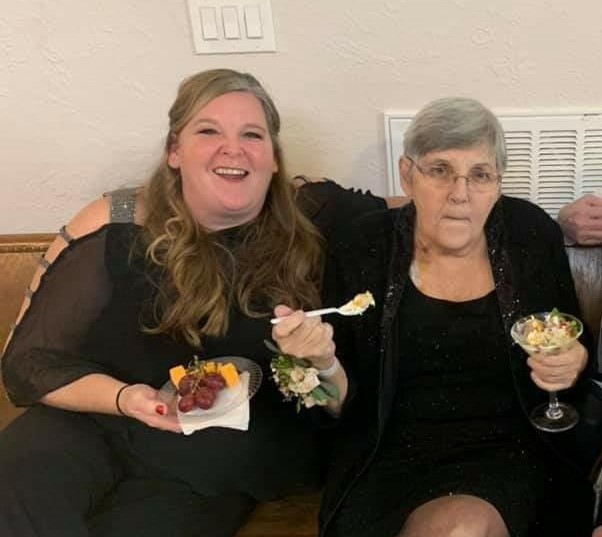
Virginia “Bunny” Black grew up near Houston, Texas, in a large family, one of eight siblings. After graduating high school, she eventually found herself in the Piney Woods of East Texas, where she attended Tyler Junior College. Bunny works full-time as manager of a local nonprofit retail store in Kilgore. She and her siblings have remained close-knit, persevering through both parents’ cancer diagnoses and the untimely death of one sister.
Just a few weeks ago, she found out that her older sister, Sandy, has late-stage lung cancer. As Bunny struggled to juggle obligations and her desperate desire to be with her sister, coronavirus protocols began in Texas. Here’s how it is affecting her and her family, in her own words, edited for clarity and length.
“I was devastated when I received the news that my sister, Sandy, had stage four lung cancer. It was a hard blow to our family, especially since we had already been through this before. Cancer insidiously lurks in our family history, and here it was again. Sandy was deeply shaken by the diagnosis. When she called me, I did what I do best. I remained steady and comforting in time of crisis. She has always depended on me for reassurance and level-headedness, and I wouldn’t fail her now. I promised her that we would get through this together. I told her that we still had some time. I heard her struggle through tears to say, ‘Okay Bunny, okay.’

Sandy lives in Kingwood, outside of Houston. On my days off, I would make the four-hour drive to see her. I am manager of a retail store in Kilgore, and it wasn’t always easy to get two days off in a row to make the trip, so I often drove down for just a day and made the return trip back early the next morning. She was in rapid decline, so I made the necessary sacrifices, with the support of family members and coworkers.
When Sandy was admitted to the hospital a few weeks ago, I knew I would need to use preciously-hoarded PTO (personal time off) to spend what little time we had left together. She would want that, and most importantly, she would need that. I began packing my bags. Then something happened.
Flurries of news reports announced that coronavirus, the illness that I had vaguely heard about over the past three months, had made its way from China all the way to Texas. Numbers showed it was quickly spreading, putting older Americans and those with underlying health problems at serious risk.
In a matter of days, the store where I work was suddenly shorthanded. I certainly wouldn’t be able to leave now. And my PTO bank would be depleted if they closed us down. I would have to use it to cover my paycheck because the company doesn’t offer paid sick leave. I was less concerned about my paycheck, though, than I was [about] my family. As the gravity of the situation was beginning to become apparent, I sent my granddaughter, who was living with me, to stay with another relative. I couldn’t risk exposing her to the virus if I got infected at work. I kept thinking, ‘What about Sandy? I can’t risk exposing her, either. What do I do? Do I leave and perhaps lose my job?’ I didn’t get to think too long about my next step. The hospital where she had been admitted made the decision for me. They closed its doors to visitors and non-essential staff.
The past week has been surreal. In a blink of an eye, it feels like everything has changed. All the things we take for granted are vividly important now. The hospital finally let my niece in to stay with my sister, which I am grateful for. We tried video chatting, but Sandy grew frustrated with not being able to communicate the way she wanted. It caused her a great deal of anxiety, so I chose to just call when she was feeling well enough to talk.
My beautiful, sweet sister is dying. These last days were supposed to be ours, but we remain separated by quarantines, travel restrictions and financial strain. COVID-19 hasn’t made me sick, but it certainly has broken my heart.”
Jennifer Toon is a formerly incarcerated criminal justice advocate who was born and raised in East Texas. She attended Kilgore High School, and U.T. Tyler, and studied journalism at The University of Houston. She has 25 years of criminal justice involvement inside and outside the gates. Jennifer has written for the state prison newspaper, The Echo, for over ten years and as a freelance writer she has published work with The Texas Observer and The Marshall Project.
Thanks for reading this story. Just one more thing. If you believe in the power of local journalism here in Tyler, I'm hoping that you'll help us take The Loop to the next level.
Our readers have told us what they want to better understand about this place we all call home, from Tyler's north-south divide to our city's changing demographics. Power, leadership, and who gets a seat at the table. How Tyler is growing and changing, and how we can all help it improve. Local arts, culture, entertainment, and food.
We can't do this alone. If you believe in a more informed, more connected, more engaged Tyler, help us tell the stories that need to be told in our community. Get free access to select Loop events, behind-the-scenes updates about the impact and goals of our work, and, above all, a chance to play a part in bringing more fresh, in-depth, unexpected journalism to Tyler.







